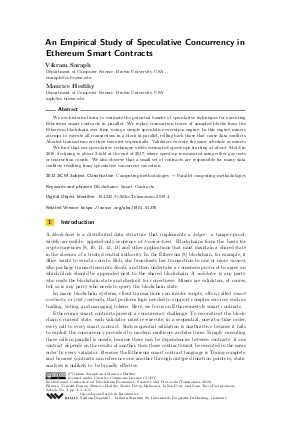An Empirical Study of Speculative Concurrency in Ethereum Smart Contracts
Authors Vikram Saraph, Maurice Herlihy
-
Part of:
Volume:
International Conference on Blockchain Economics, Security and Protocols (Tokenomics 2019)
Part of: Series: Open Access Series in Informatics (OASIcs)
Part of: Conference: International Conference on Blockchain Economics, Security and Protocols (Tokenomics) - License:
 Creative Commons Attribution 3.0 Unported license
Creative Commons Attribution 3.0 Unported license
- Publication Date: 2020-03-17
File

PDF
OASIcs.Tokenomics.2019.4.pdf
- Filesize: 0.66 MB
- 15 pages
Document Identifiers
Related Versions
Subject Classification
ACM Subject Classification
- Computing methodologies → Parallel computing methodologies
Keywords
- Blockchains
- Smart Contracts
Metrics
- Access Statistics
-
Total Accesses (updated on a weekly basis)
0Document
0Metadata
Abstract
We use historical data to estimate the potential benefit of speculative techniques for executing Ethereum smart contracts in parallel. We replay transaction traces of sampled blocks from the Ethereum blockchain over time, using a simple speculative execution engine. In this engine, miners attempt to execute all transactions in a block in parallel, rolling back those that cause data conflicts. Aborted transactions are then executed sequentially. Validators execute the same schedule as miners. We find that our speculative technique yields estimated speed-ups starting at about 8-fold in 2016, declining to about 2-fold at the end of 2017, where speed-up is measured using either gas costs or instruction counts. We also observe that a small set of contracts are responsible for many data conflicts resulting from speculative concurrent execution.
Cite As Get BibTex
Vikram Saraph and Maurice Herlihy. An Empirical Study of Speculative Concurrency in Ethereum Smart Contracts. In International Conference on Blockchain Economics, Security and Protocols (Tokenomics 2019). Open Access Series in Informatics (OASIcs), Volume 71, pp. 4:1-4:15, Schloss Dagstuhl – Leibniz-Zentrum für Informatik (2020)
https://doi.org/10.4230/OASIcs.Tokenomics.2019.4
BibTex
@InProceedings{saraph_et_al:OASIcs.Tokenomics.2019.4,
author = {Saraph, Vikram and Herlihy, Maurice},
title = {{An Empirical Study of Speculative Concurrency in Ethereum Smart Contracts}},
booktitle = {International Conference on Blockchain Economics, Security and Protocols (Tokenomics 2019)},
pages = {4:1--4:15},
series = {Open Access Series in Informatics (OASIcs)},
ISBN = {978-3-95977-108-5},
ISSN = {2190-6807},
year = {2020},
volume = {71},
editor = {Danos, Vincent and Herlihy, Maurice and Potop-Butucaru, Maria and Prat, Julien and Tucci-Piergiovanni, Sara},
publisher = {Schloss Dagstuhl -- Leibniz-Zentrum f{\"u}r Informatik},
address = {Dagstuhl, Germany},
URL = {https://drops.dagstuhl.de/entities/document/10.4230/OASIcs.Tokenomics.2019.4},
URN = {urn:nbn:de:0030-drops-119684},
doi = {10.4230/OASIcs.Tokenomics.2019.4},
annote = {Keywords: Blockchains, Smart Contracts}
}
Author Details
References
- Parwat Singh Anjana, Sweta Kumari, Sathya Peri, Sachin Rathor, and Archit Somani. An Efficient Framework for Concurrent Execution of Smart Contracts. CoRR, abs/1809.01326, 2018. URL: http://arxiv.org/abs/1809.01326.
- Nellie Bowles. CryptoKitties, Explained... Mostly. The New York Times, December 2017. URL: https://www.nytimes.com/2017/12/28/style/cryptokitties-want-a-blockchain-snuggle.html.
- Consensys. Harness the power of Ethereum. https://consensys.net/. As of 22 November 2018.
- Hyperledger Consortium. HyperLedger Fabric Release 1.3. URL: https://hyperledger-fabric.readthedocs.io/en/release-1.3/.
- R3 Corda. Writing a contract. URL: https://docs.corda.net/releases/release-M1.0/tutorial-contract.html. As of 31 December 2018.
- Crytokitties. CryptoKitties | Collect and breed digital cats! https://www.cryptokitties.co/. As of 22 November 2018.
- Thomas Dickerson, Paul Gazzillo, Maurice Herlihy, and Eric Koskinen. Adding Concurrency to Smart Contracts. In Proceedings of the ACM Symposium on Principles of Distributed Computing, PODC '17, pages 303-312, New York, NY, USA, 2017. ACM. URL: https://doi.org/10.1145/3087801.3087835.
- Ethereum. URL: https://github.com/ethereum/.
- IOHK. Cardano Settlement Layer Documentation. https://cardanodocs.com/technical/plutus/introduction/. As of 31 December 2018.
- Aggelos Kiayias, Alexander Russell, Bernardo David, and Roman Oliynykov. Ouroboros: A Provably Secure Proof-of-Stake Blockchain Protocol, 2017. As of 24 November 2018 URL: https://iohk.io/research/papers/#ouroboros-a-provably-secure-proof-of-stake-blockchain-protocol.
- David Mazieres. The Stellar Consensus Protocol: A Federated Model for Internet-level Consensus, 2015. As of 24 November 2018. URL: https://www.stellar.org/papers/stellar-consensus-protocol.pdf.
- Satoshi Nakamoto. Bitcoin: A Peer-to-Peer Electronic Cash System, May 2009. URL: http://www.bitcoin.org/bitcoin.pdf.
- David Schwartz, Noah Youngs, and Arthur Britto. The Ripple Protocol Consensus Algorithm. https://ripple.com/files/ripple_consensus_whitepaper.pdf, 2014.
- Solidity documentation. URL: http://solidity.readthedocs.io/en/latest/index.html.
- Nick Szabo. Formalizing and Securing Relationships on Public Networks. First Monday, 2(9), 1997. URL: http://firstmonday.org/ojs/index.php/fm/article/view/548.
-
Gavin Wood. Ethereum: A secure decentralised generalised transaction ledger. Ethereum project yellow paper, 151:1-32, 2014.

